NEW DELHI/ISLAMABAD: Pakistan on Tuesday condemned a social media campaign in India behind the ‘sale’ of prominent Muslim women through a fake online auction app in a case that has sparked anger and outrage across the country.
More than 100 Muslim women, including journalists, activists, politicians, and even acclaimed Bollywood actress Shabana Azmi, were put up for auction on “Bulli Bai,” an open source app hosted on the web platform GitHub. The app, which has since been taken down, was the second attempt in less than a year to harass Muslim women. Last July, nearly 80 Muslim women were offered for sale in a similar “Sulli Deals” campaign.
“Bulli Bai” is a derogatory slang for Indian Muslims. Though there was no real sale involved, the Muslim women listed on the website have said the auction was meant to humiliate them, since many of them are vocal about rising Hindu nationalism in India and some of the policies of Prime Minister Narendra Modi and his Hindu nationalist Bharatiya Janata Party.
“Pakistan strongly condemns the despicable and totally unacceptable harassment and insult of Muslim women on the Internet and purpose-built online application in India,” the Pakistani foreign office said in a statement.
“Their doctored images have been placed on the Internet application with outrageous captions for ‘auction.’ Hate-mongering followers of such applications attacked the dignity of nearly 100 influential Muslim women by ‘bidding’ on them with deeply offensive remarks.”
“This is the newest low in the violent streak of hate attacks against minorities in India ... These horrifying occurrences have left Muslim women traumatized and in deep fear.”
Indeed, many among India’s 170 million Muslims say they have been relegated to the status of second-class citizens since Modi’s BJP came to power in 2014. Indian women, particularly Muslims, have often found themselves as the target of hate and abuse on social media platforms, including Twitter. Outspoken Muslim women have received threats of rape and violence.
The head of the National Commission for Women, Rekha Sharma, who is a member of the BJP, said the commission, which works closely with the Indian government on issues concerning women, was in touch with police.
“With the help of the Delhi police we tried to find out the individuals responsible but the problem is that the website is located in some other countries,” Sharma said. “They are not giving any details. Police are therefore finding it difficult to reach the right persons.”
Delhi Police did not respond to repeated attempts by Arab News on Monday to reach them but the Associated Press on Tuesday quoted Satej Patil, the technology minister for the Maharashtra state, as saying the cyber unit of Mumbai Police had detained a 21-year-old engineering student from the southern city of Bengaluru in the neighboring Karnataka state and registered a case against him. Police did not reveal the identity of the suspect, and it wasn’t clear whether the man had made the auction website.
Kavita Krishnan, secretary of the All India Progressive Women Association (AIPWA), said the online attacks on Muslim women was “not separate from the majoritarian project of the ruling BJP.”
Fatima Zohra, a Mumbai-based lawyer whose photos were displayed on both apps, also said the issue should be seen as part of growing Islamophobia in India.
“Deep down I feel that all this happened because the culprits were given impunity as the victims are Muslim women,” she said. “What I wonder most is only Muslim women are targeted and especially those who are vocal and opinionated regarding anti-democratic policies of the state.”
Hana Mohsin Khan, a professional pilot based in New Delhi, said a repeat of the online campaign had left her feeling hopeless.
Khan filed a police complaint last July, when her name first appeared on the “Sulli Deals” app.
“I feel so dehumanized as a woman and a Muslim,” Khan said, adding: “I don’t see anything happening to the perpetrators again. I am really in a sad state.”
But Ismat Ara, whose name and photo have been listed on the “Bulli Bai” app and who has lodged a complaint with authorities, said it was “important” to hold on to hope.
“Since no arrests have been made in the earlier case, it makes me skeptical,” Ara said. “At the same time it is also important to be hopeful because the first step has been taken by filing a police case and hope that something will come out that will put a stop to such incidents.”
Pakistan condemns fake online auctions of Indian Muslim women as victims hope for justice
https://arab.news/y2p93
Pakistan condemns fake online auctions of Indian Muslim women as victims hope for justice
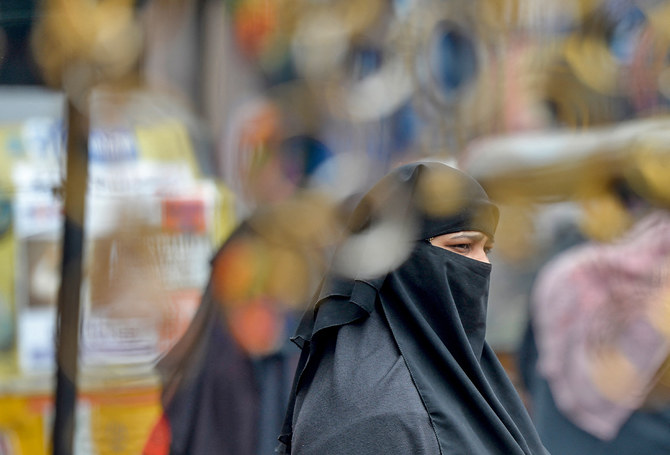
- BJP-led National Commission on Women says following up on case, in touch with police
- 'Bulli Bai' app is second attempt in less than a year to harass Muslim women online
Suspected militants bomb school for girls in northwestern Pakistan
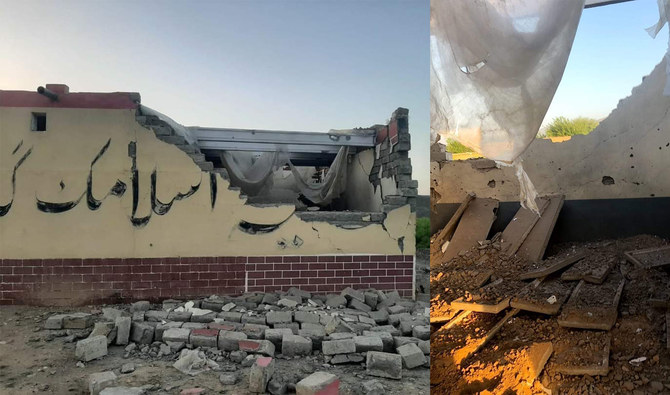
- No one harmed as militants blow up girls school in North Waziristan district, say police
- Pakistan witnessed attacks on girls’ schools until 2019 by militants opposed to female education
DERA ISMAIL KHAN, Pakistan: Suspected militants blew up a school for girls in a former stronghold of the Pakistani Taliban in the country’s volatile northwest, badly damaging the structure but no one was harmed in the overnight attack, a local police official said Thursday.
The attack happened Wednesday night on the only school for girls in Shawa, a town in the North Waziristan district in the Khyber Pakhtunkhwa province bordering Afghanistan, local police chief Amjad Wazir said.
He said the attackers used an explosive device to destroy the private Aafia Islamic Girls Model School, where 150 girls studied. Wazir said the school guard was beaten up by the insurgents, who then fled the scene.
There was no immediate claim for the attack, but suspicion was likely to fall on militants who have often targeted girls’ schools in the province in recent years as they believed women should not be educated.
On Thursday, the United Nations Children’s Fund, UNICEF, strongly condemned the attack, calling it a “despicable and cowardly act that could jeopardize the future of many young and talented girls.”
In a statement, Abdullah Fadil, the UNICEF representative in Pakistan, said the “destruction of a girls’ school in a remote and underserved area is a heinous crime detrimental to national progress.”
He pointed to a statement by Prime Minister Shehbaz Sharif on Wednesday, declaring an education emergency and pledging to work toward enrolling 26 million out-of-school children.
Pakistan witnessed multiple attacks on girls’ schools until 2019, especially in the northwestern Swat Valley and elsewhere in the northwest where the Pakistani Taliban for years controlled the former tribal regions.
In 2012, the insurgents attacked Malala Yousafzai, a teenaged student and advocate for the education of girls who went on to win the Nobel Peace Prize.
The Pakistani Taliban, who are known as Tehreek-e-Taliban Pakistan or TTP, were evicted from Swat and other regions in recent years. TTP is a separate group but an ally of the Afghan Taliban, who seized power in Afghanistan in 2021.
US CENTCOM commander, Pakistan Army chief discuss joint training, regional security
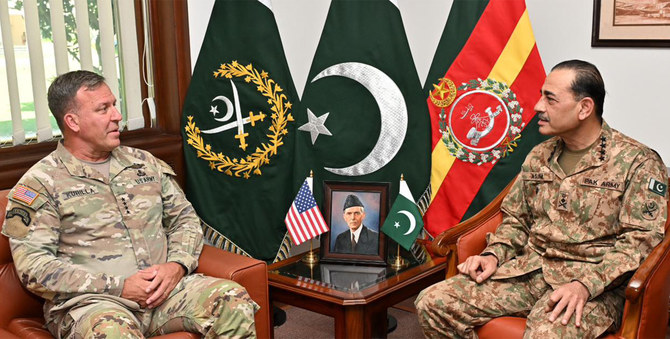
- US CENTCOM directs and enables military operations with allies and partners to increase regional security
- CENTCOM commander appreciated Pakistan Army’s contribution in war against “terrorism,” says army
ISLAMABAD: Pakistan’s Army Chief General Syed Asim Munir and General Michael Erik Kurilla, the commander of the US Central Command (CENTCOM) discussed regional security and joint training in a meeting on Thursday, the army’s media wing said.
US CENTCOM directs and enables military operations with its allies to increase regional security and promote US interests. Among its stated command priorities is to counter violent extremist organizations.
Pakistan has seen a surge in militant attacks in its Balochistan and Khyber Pakhtunkhwa (KP) provinces bordering Afghanistan since a fragile truce between the state and the Pakistani Taliban broke down in Nov. 2022.
Both Pakistan and US have collaborated over the years to take out militant organizations, especially in Pakistan’s restive tribal areas bordering Afghanistan.
Pakistan Army’s Inter-Services Public Relations (ISPR) said General Kurilla called on Munir at the army’s headquarters in Rawalpindi.
“During the meeting, matters of shared interests, particularly cooperation in regional security matters came under discussion,” the ISPR said.
“Both sides discussed avenues of joint training and reiterated the need for enhancing training interactions between CENTCOM and Pakistan Army.”
The ISPR said Kurilla acknowledged Pakistan Army’s success in its fight against “terrorism” and appreciated its continued efforts to bring peace and stability to the region.
Ties between Islamabad and Washington, once close allies, have just started to warm after some years of frosty relations, mostly due to concerns about Pakistan’s alleged support of the Taliban in Afghanistan. Pakistan denies this support.
Relations strained further under the government of former prime minister Imran Khan, who ruled from 2018-22 and antagonized Washington throughout his tenure, welcoming the Taliban takeover of Afghanistan in 2021 and later accusing Washington of being behind attempts to oust him. Washington has dismissed the accusation.
The government of PM Shehbaz Sharif that took over after Khan and whose term ended last year tried to mend ties but analysts widely believe the United States will not seek a significant broadening of ties with Islamabad in the near future but remain mostly focused on security cooperation, especially on counterterrorism and Afghanistan.
Pakistan’s foreign reserves with central bank surge past $9 billion after IMF inflows
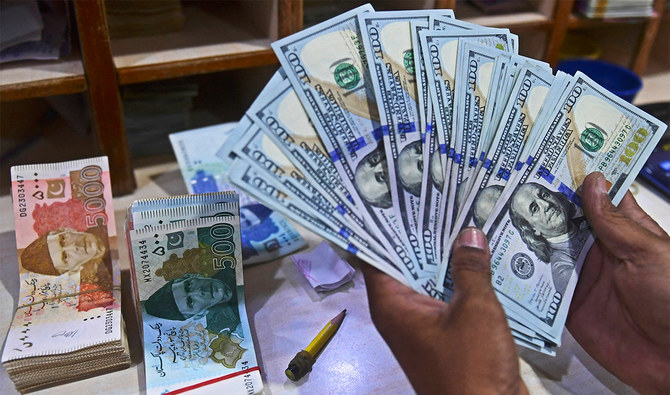
- Pakistan last month received $1.1 billion from IMF as final tranche of its $3 billion loan program
- Talks between IMF and Pakistan for a fresh loan program is expected to be held this month
KARACHI: Pakistan’s foreign exchange reserves with its central bank surged to $9.12 billion on Thursday, data from the State Bank of Pakistan (SBP) after Islamabad received the final tranche of $1.1 billion from the International Monetary Fund (IMF) last month.
The SBP confirmed on April 30 that Pakistan had received the final tranche of $1.1 billion as part of a $3 billion IMF loan program it entered last summer.
The South Asian country is expected to hold discussions this month with an IMF mission for a “larger and longer” program that Islamabad hopes would help avert its macroeconomic crisis.
“Foreign reserves held by the State Bank of Pakistan total $ 9,120.3 million,” the SBP said in a statement. It added that total reserves held by the country stood at $ 14,458.9 million, out of which net foreign reserves worth $ 5,338.6 million were by commercial banks.
Pakistan has been struggling with a chronic economic crisis since April 2022 that has seen its foreign exchange reserves plummet to historic lows and its national currency depreciate significantly against the US dollar.
The South Asian country has turned to international financial institutions and multilateral partners to secure external financing in a bid to stave off a balance of payment crisis.
Desperate to shore its foreign reserves, Pakistan has recently welcomed visits by business delegations and diplomats from Saudi Arabia, Japan, Qatar and Azerbaijan to attract investment.
Last year Pakistan set up the Special Investment Facilitation Council, a body consisting of Pakistani civilian and military leaders and specially tasked to promote investment in Pakistan. The council is so far focusing on investments in the energy, agriculture, mining, information technology and aviation sectors and specifically targeting Gulf nations.
Pakistan fast bowler Amir to miss first T20I against Ireland after visa delay

- Mohammad Amir gets travel visa, expected to join squad from Friday, confirms PCB
- Pakistan will play three T20Is against Ireland and four against England this month
ISLAMABAD: Left-arm fast bowler Mohammad Amir has received his travel visa but won’t make it in time to play the first T20I match against Ireland on Friday, the Pakistan Cricket Board (PCB) has confirmed.
Amir did not travel to Ireland with Pakistan’s squad this week due to visa delay issues. Pakistan will play a three-match T20I series against the Irish side from May 10-14 in Dublin before departing for the UK where they will play against England in a four-match T20I series.
“Fast bowler Mohammad Amir will miss the first T20I due to delays in the issuance of his visa,” the PCB said in a statement on Thursday. “He is expected to join the side on Friday.”
Amir, 32, came out of international retirement last month for the home series against New Zealand, drawn 2-2. The pacer is eyeing a spot in the 15-man squad for next month’s T20 World Cup in the Caribbean and the United States.
The three-match series in Dublin is also World Cup preparation as both teams are in the same group alongside India, US and Canada.
Amir will bolster Pakistan’s pace battery which comprises the likes of Naseem Shah, Shaheen Shah Afridi, and Haris Rauf.
Squads:
Ireland: Paul Stirling (captain), Mark Adair, Ross Adair, Andrew Balbirnie, Curtis Campher, Gareth Delany, George Dockrell, Graham Hume, Barry McCarthy, Neil Rock, Harry Tector, Lorcan Tucker, Ben White, Craig Young
Pakistan: Babar Azam (captain), Abrar Ahmed, Azam Khan, Fakhar Zaman, Haris Rauf, Hasan Ali, Iftikhar Ahmed, Imad Wasim, Mohammad Abbas Afridi, Mohammad Amir (unavailable for first T20I), Mohammad Rizwan, Muhammad Irfan Khan, Naseem Shah, Saim Ayub, Salman Ali Agha, Shadab Khan, Shaheen Shah Afridi and Usman Khan.
Pakistan to introduce new SOPs for security of Chinese nationals— interior minister
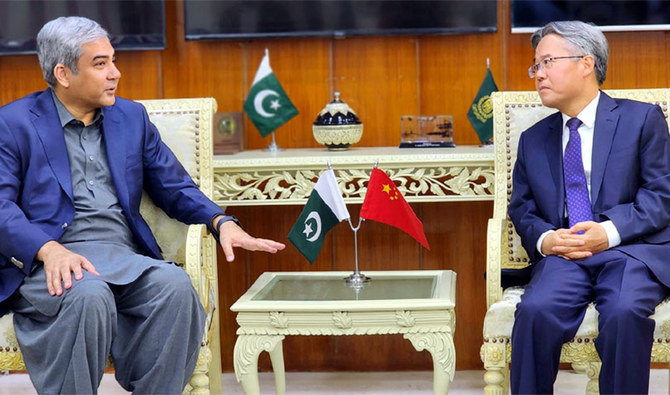
- Pakistan has recently witnessed surge in militant attacks on Chinese nationals
- A suicide attack in northwestern Pakistan in March killed five Chinese engineers
ISLAMABAD: Pakistan’s government will craft new standard operating procedures (SOPs) for the security of Chinese nationals working and living in the country, Interior Minister Mohsin Naqvi said on Thursday.
Pakistan has seen a rise in attacks on Chinese nationals in the country in recent months. A suicide bomber in March rammed his vehicle into a convoy of Chinese engineers working on a hydropower project in northwestern Pakistan. Five Chinese engineers were killed in the attack.
Pakistan has said it has since then taken steps to enhance the security of Chinese nationals in the country.
“Interior Minister Mohsin Naqvi says new Standard Operating Procedures (SOPs) related to the security of Chinese nationals will be crafted and it will be implemented in letter and spirit,” the state-run Radio Pakistan reported.
Naqvi was speaking to Chinese Ambassador to Pakistan Jiang Zaidong in Islamabad, the state media said, adding that he vowed to bring the perpetrators of the March attack to justice.
“Mohsin Naqvi said no conspiracy can sabotage the decades-old Pak-China friendship,” Radio Pakistan said.
Zaidong expressed satisfaction with the measures taken by Pakistani authorities for the security of Chinese nationals.
The Dasu attack was the third major one in a little over a week on China’s interests in the South Asian nation, where Beijing has invested over $65 billion in energy, infrastructure and other projects as part of its wider Belt and Road initiative.
Chinese interests in Pakistan’s southwestern Balochistan province have also been under attack primarily by militants who seek to push Beijing out of the mineral-rich territory.










